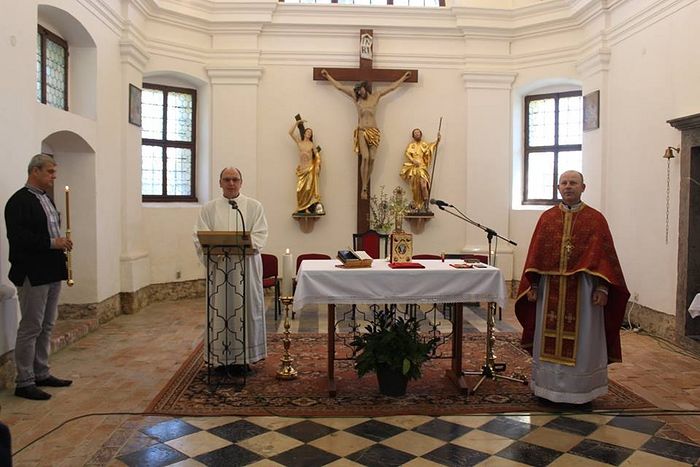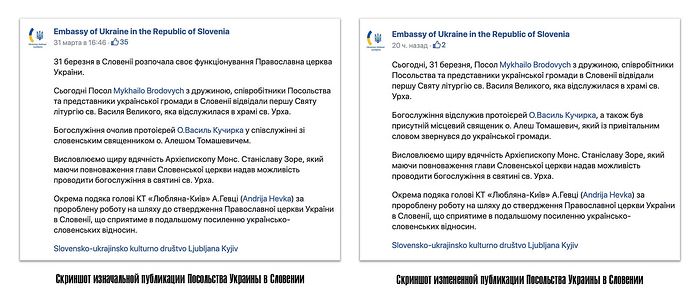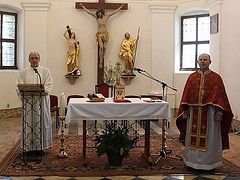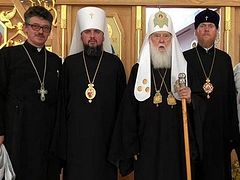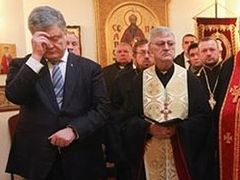Ljubljana, Slovenia, April 9, 2019
On April 1, OrthoChristian reported that “Archpriest” Vasily Kuchirka of the schismatic Ukrainian group had served the first Liturgy in the capital city of Ljubljana for the local Ukrainian community as the beginning of a new parish community.
Moreover, as the service was celebrated in the Catholic Church of St. Urkha, a local Catholic priest Ales Tomashevich was also present at the altar table with Kuchirka. The Ukrainian embassy in Slovenia reported that a new parish had been started and that the Catholic priest had concelebrated with the schismatic Orthodox priest.
After the new community’s first service was widely publicized, given that establishing a parish outside of Ukraine violates the terms of the tomos of autocephaly granted by the Patriarchate of Constantinople and that celebration with a Catholic priest violates the canons of Orthodoxy, the Ukrainian embassy began to revise its reporting, deleting any mention of concelebration with the Catholic priest.
The Union of Orthodox Journalists has published comparative screen shots of the original and the revised messages:
The original message (left) specifies that the Catholic priest concelebrated, while the revised message (right) says only that he was present and greeted the congregation.
Moreover, when the service was announced beforehand by the embassy together with the Society of Ukrainians in Slovenia on March 19, the statement read: “The service will be headed by Archpriest Vasily Kuchirka with the concelebration of the local priest Fr. Ales Tomashevich.”
This statement remains online with the unedited original text.
On April 2, the press service of the so-called “Orthodox Church of Ukraine” issued a statement denying that the church has created or intends to create a new parish in Slovenia, saying only that the service was offered in response to the request of Ukrainian diplomats, and that the Catholic priest was simply present at the service, as it had taken place in a Catholic church.
This release was later picked up by several other sites, including English-language sites, that seem not to have looked into the matter any further.
After our initial report, the schismatic priest in question, Vasily Kuchirka wrote to us to say that the Catholic priest had not concelebrated with him. We responded that the Catholic priest was not simply present, but stood at the altar table throughout the service (he would have been behind the iconostasis were there one), stood at the High Place in the altar with the Ukrainian priest at the appropriate times, and addressed the people in the midst of the service following the Gospel reading. Kuchirka responded only that he was standing in those places because it was a Catholic altar and he is a Catholic priest.
While some sites, such as the Ukrainian autocephalist site Cerkvarium, claimed that the Catholic priest could not have been concelebrating because he was not fully vested, wearing only his alb and stole, the website of the Žumberak Vicariate of the Catholic church in Croatia writes: “It is very interesting that the Catholic priest was dressed in liturgical attire and somehow participated in the service.”
Moreover, in the Redemptionis Sacramentum, the manual for how to properly celebrate Mass issued by the Congregation for Divine Worship and the Discipline of the Sacraments of the Catholic Church in 2004, we find that while the main celebrant of a Mass (in this case the Ukrainian schismatic priest as the celebrant of the Liturgy) must wear a chasuble (the equivalent of the Orthodox phelonion) over his alb, the other priests may “omit the chasuble, using the stole over the alb” in certain circumstances.
Thus, whether the Catholic priest concelebrated or not is not determined by the fact that he was wearing only the alb and stole.
And while Kuchirka protested reports of concelebration in his message to us, he did not, however, argue that a new parish was not being founded. Moreover, in a post from April 8 (in which Vasily Kuchirka is tagged), Andrija Hevka, a Ukrainian living in Ljubljana, Slovenia, writes of the founding of a new community and its ecumenical character:
Dear friends,
We've already informed you that by the grace of God, March 31, 2019, the Ukrainians of Slovenia and the Ukrainians of Northern Italy, and the brothers and sisters of in Christ from Slovenia began with our joint prayers in the Church of St. Urkha in Ljubljana. We feel that we are doing good and right. We will be united by common prayer and hope for a better future.
Kurhicka lives in Udine in northern Italy, less than two hours from Ljubljana by car. Thus, unless he and his communities transfer to the Patriarchate of Constantinople, they are in violation of the terms of the tomos of autocephaly.
Hevka continues on an ecumenical note:
We will try to forget the centuries-old conflicts and to overcome unnecessary questions, including which religion we belong to, and whether we came from the East, West, North or South. Completely unimportant questions. We all have the same goal: WITH GOD'S HELP IN THE FUTURE. ALWAYS WITH GOD!
Hevka then notes that there will be more Liturgies served for this community:
It is important to remember and not forget our efforts. We invite you to visit the Divine Liturgy as often as possible. The next Divine Liturgy will be for Pascha. We will soon announce the exact date and time.
Further, the information that remains in the revised statement from the Ukrainian embassy also leaves no doubt that a parish community has been created, which will continue to be active.
First, the statement notes that the Ukrainian ambassador and his wife and other embassy staff were present at the first Divine Liturgy, which was served in the Catholic Church of St. Urkha, which, of course, implies that there will be more, which is confirmed by the statement from Andrija Hevka.
Second, the statement continues: “We express our sincere gratitude to Archbishop Mons. Stanislav Zore, who having the powers of the head of the Slovenian Church provided the opportunity to conduct worship services in the sanctuary of St. Urkha.” Ukrainian, like all Slavic languages, has two types of verbs. Perfective verbs indicate a completed action, where as imperfective verbs describe regular, repeated actions. The verb "conduct" used on the Ukrainian Embassy's site is an imperfective verb, meaning that the Catholic Archbishop granted permission to conduct services regularly, not just once.
Finally, the statement thanks an A. Gevtsy “for his work toward the establishment of the Orthodox Church of Ukraine in Slovenia,” the meaning of which is clear enough, without any explanation.
It must also be noted that Slovenia is, in fact, the canonical territory of the Serbian Orthodox Church, more specifically of His Eminence Metropolitan Porfirije of Zagreb and Ljubljana. The “Orthodox Church of Ukraine” considers itself to be an autocephalous Local Church of the global Orthodox Church (though the other Local Churches, except for Constantinople, do not recognize it as such). The primate “Metropolitan” Epiphany Dumenko commemorates His Holiness Patriarch Irinej of Serbia during the services, which means, at least on paper, that the OCU should respect the canonical territory of the Serbian Church, though there is no indication that a blessing was given by or even sought from Met. Porfirije for this Liturgy.
Moreover, Kuchirka commemorated Patriarch Bartholomew of Constantinople during the service, which is improper, given that he was serving on the canonical territory of the Serbian Church.
OrthoChristian contacted Kuchirka to ask how often he would be serving in Slovenia, though he had not responded as of the time of publication of this report.
Follow us on Facebook!

